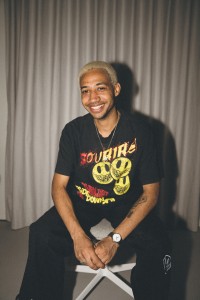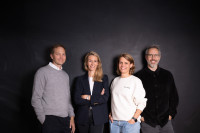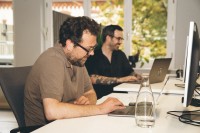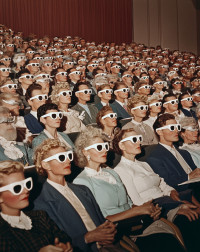For a Human Agency Culture
200 Zeichen Lorem ipsum dolor sit amet, consectetuer adipiscing elit. Aenean commodo ligula eget dolor. Aenean massa. Cum sociis natoque penatibus et magnis dis parturient montes, nascetur ridiculus mus. Donec quu.
Kim Notz
01. October 2024
In our industry, people like to talk about the “people business.” But all too often, what’s meant are simply the personal relationships on which agencies thrive. Taken literally, though, the term goes much deeper: it’s about people—and therefore about culture. Agencies are made up of people, and if the product of their work isn’t completely interchangeable, that’s largely thanks to agency culture.
All the more surprising, then, that the agency world has lost much of its appeal for young talent—and that we’re doing so little to change it. The issue has many layers. For many newcomers, agencies still seem stuck in the 1990s. The cultural shifts of the past 25 years simply haven’t registered in the minds of many young people.
That lack of appeal has consequences: even the wide range of roles within agencies is barely known to the next generation. And who chooses a career they’ve never heard of? The talent shortage we see today—and the skills shortage of tomorrow—are in many ways problems of our own making. So what does the agency world need to do to escape this trap?
Lorem ipsum dolor sit amet, adipiscing elit.
First of all, what’s needed is a fresh look at today’s agency culture—and at the people who shape it. Every agency has a core of cultural carriers, positive “accelerants” who drive it forward. More than that, agencies fundamentally live from their own identity and from the differentiating power that springs from their culture.
And because of natural staff turnover, that culture is never static. New people always bring a piece of their own culture with them.
Can Agency Culture Be Planned?
Agency culture is a fluid thing—an amorphous system that constantly adapts in order to sustain itself. That’s how agencies stay connected to the zeitgeist, to which agency culture itself is subject. At the same time, it’s our job as agencies to tap into that zeitgeist. That’s what marketers hire us for. And to help brands evolve, we need empathy, intuition, and a good dose of gut feeling—qualities that are deeply human. We need to be human.
I spoke about this in episode #121 with Amelie Schad, who has been Managing Director of Mother Berlin for the past year. She has an impressive career behind her: starting out at Serviceplan, later helping to build the Berlin creative agency Antoni, then moving to Los Angeles for two years to open the first U.S. office for Katjes. In 2021 she returned to Berlin, spent a short time at Anomaly, had a child, and is now building the Berlin arm of the creative agency Mother.
Lorem ipsum dolor sit amet, adipiscing elit.
When André Kemper and Tonio Kröger founded Antoni in 2015, Amelie was in her mid-20s—right in the middle of an agency’s founding phase for the first time. Can the culture of a new agency be planned, or does it simply emerge on its own? Back then there were certainly efforts at planning, but in the end, Antoni’s culture developed organically. And in her view, that has everything to do with people. From pre-existing constellations—colleagues who already knew each other, in some cases friends—a small, tight-knit core emerged.
Culture can’t be imposed, least of all from the top down. It grows—and shaping it is everyone’s responsibility. There have been agencies, like Springer & Jacoby, that shaped entire generations of advertisers. But not everything from those days has aged well. Gen Z, in particular, wants to work and live differently, with a value system distinct even from Millennials, let alone older generations. And even within generations, the differences can be striking. Agency culture is never finished; it’s in constant evolution.
Taking the Talent Issue Seriously
Talent, people, the next generation—these are issues close to Amelie’s heart. Every agency stands or falls with its people. They are the most important asset. All the more remarkable, then, that today’s major industry events are dominated by AI, while the next generation of talent barely features. The truth is, our industry still doesn’t take the issue of young talent seriously enough.
For young people, what’s attractive is engaging with the zeitgeist—grappling with social developments, exploring trends, and constantly learning new things. Efficiency drives and budget pressure exist in companies as well. The difference, for agencies, lies in how we work. And that brings us back to the subject of culture.
The extreme presence culture once taken for granted in many agencies had already begun to shift—toward a more human and healthier way of working—even before the pandemic. The repositioning of Human Resources as “People & Culture” reflects this change. Mother, too, was founded back in 1996 around a kitchen table, born out of the founders’ desire to build an agency where they themselves would want to work. The name Mother has always stood for professionalism and humanity.
Since then, Mother has evolved its core thought—making our mother proud—into a forward-looking vision: making our children proud. That shift signals a new perspective, toward the future and toward the next generation. Hovering over the industry, meanwhile, is the looming threat of a talent shortage. Attractiveness has declined further in recent years, and the industry’s image—unfairly, in large part—still seems stuck in the Springer & Jacoby era.
Time to Step Away from the Desk
Changing this—and giving the agency industry a new narrative—remains an unfulfilled task, much to Amelie’s frustration. Neither of us can quite understand why the industry hasn’t managed it. The old narrative seems so powerful that it still holds us back today, especially when it comes to attracting young talent. One way forward is through universities: being present there, supervising master’s theses, running practical projects, creating collaborations with existing clients on topics that genuinely interest students—and, quite simply, explaining our industry.
Gen Z, too, is willing to perform—but unlike earlier generations, they know their worth much better. As long as that healthy self-confidence stays within reasonable bounds, it can only benefit our industry. After all, what we truly need again is more time for thinking, for stepping outside, for experiencing things. Our work depends on engaging with cultural themes and trends—wherever they arise, in whatever bubble or subculture.
Lorem ipsum dolor sit amet, adipiscing elit.
And for that, we need to step away from our desks once in a while. In the tightly packed rhythm of today’s calendars, that happens less and less. What makes us, as agencies, truly interesting? And what kind of people are we looking for? In the end, we’re searching for originals—people with fresh, distinctive perspectives. But that gets lost when your calendar looks like a game of Tetris.
Or as Amelie puts it: “I don’t know anyone who’s sent 128 emails and sat through twelve Zoom meetings who then says, ‘That was a really great day.’”
Find more here:
Kontakt





